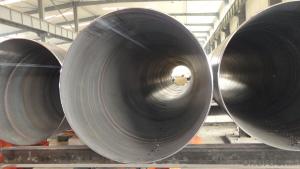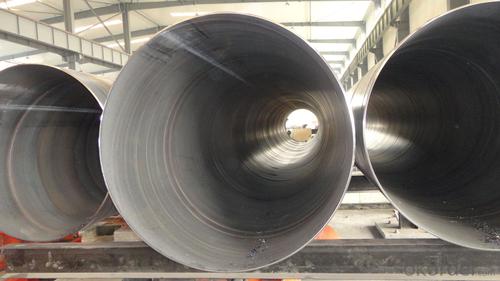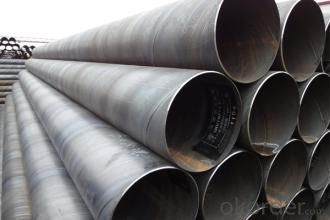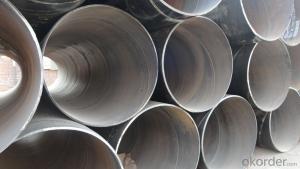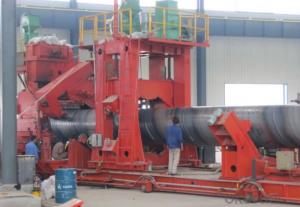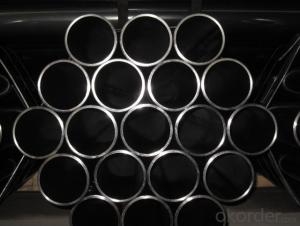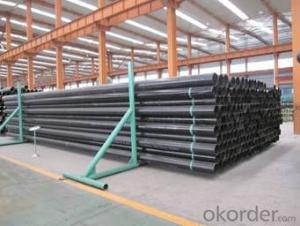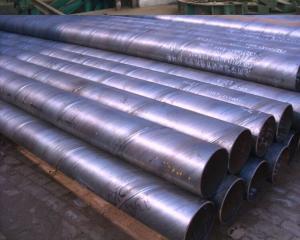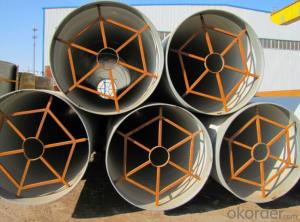SSAW Hot Rolled Steel Tubes 3
- Loading Port:
- China Main Port
- Payment Terms:
- TT or LC
- Min Order Qty:
- -
- Supply Capability:
- -
OKorder Service Pledge
OKorder Financial Service
You Might Also Like
Quick Details
Thickness: | 6 - 28 mm | Section Shape: | Round | Outer Diameter: | 219 - 3500 mm |
Place of Origin: | Tianjin (Mainland) | Secondary Or Not: | Non-secondary | Application: | Oil Pipe |
Technique: | SAW | Certification: | API | Surface Treatment: | as per your request,Black/Blue 3PE or as per your request |
Special Pipe: | API Pipe | Alloy Or Not: | Non-alloy | ||
Certificate: | ISO 9001:2008, API, SGS, BV | Material: | Q235A/B,Q345,L360 and X42-X80 grade | Package: | In bulk or bundles |
Usage: | structure pipe | Main market: | all over the world | Product name: | SSAW Spiral Steel Tube |
End: | Beveled End |
FAQ of SSAW Steel Tubes:
①How is the quality of your products?
Our products are manufactured strictly according to national and internaional standard. Guaranteed: If products’ quality don’t accord to discription as we give or the promise before you place order, we promise 100% refund.
②How about price?
Yes, we are factory and be able to give you lowest price below market one.Please trust the quotation we would give you, it is professional one.
③Why should you chose us?
Chose happens because of quality, then price, We can give you both.Additionally, we can also offer professional products inquiry, products knowledge train(for agents), smooth goods delivery, exellent customer solution proposals.
SSAW Steel TubesImages:
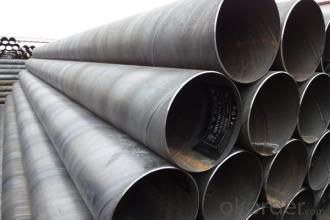
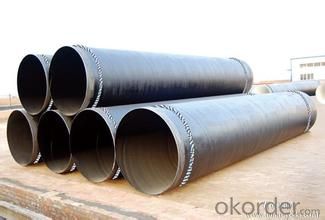
- Q: Are steel pipes suitable for wastewater treatment facilities?
- Yes, steel pipes are suitable for wastewater treatment facilities. Steel pipes are commonly used in these facilities due to their high strength, durability, and resistance to corrosion. Wastewater treatment facilities typically handle corrosive and abrasive materials, and steel pipes are able to withstand these harsh conditions. Additionally, steel pipes are available in various sizes and configurations, allowing for easy installation and customization to meet the specific needs of the facility. Furthermore, steel pipes can be easily repaired or replaced if necessary, ensuring the longevity and reliability of the wastewater treatment system. Overall, steel pipes are a suitable choice for wastewater treatment facilities due to their strength, durability, corrosion resistance, and flexibility in installation and maintenance.
- Q: How are steel pipes used in wastewater treatment?
- Steel pipes are an essential component in the wastewater treatment process. They are used to transport and distribute wastewater from various sources to the treatment facilities. Steel pipes are chosen for this purpose due to their durability, strength, and resistance to corrosion. In wastewater treatment plants, steel pipes are commonly used for multiple applications. Firstly, they are used for the intake of raw wastewater. These pipes are typically large in diameter to accommodate the high flow rate of incoming wastewater. Steel pipes are ideal for this purpose as they can withstand the pressure and turbulence of the wastewater flow. Once inside the treatment facility, steel pipes are used to transport the wastewater to different treatment processes. They connect various units such as screens, grit chambers, sedimentation tanks, and biological reactors. Steel pipes are preferred in these applications due to their ability to handle the corrosive elements present in wastewater, such as chemicals, acids, and gases. Additionally, their durability ensures a long service life, reducing maintenance and replacement costs. Steel pipes are also utilized in the wastewater treatment process for the distribution of treated water. After the wastewater is treated, it undergoes disinfection and other processes to remove harmful contaminants. The treated water is then distributed through steel pipes to be reused for irrigation, industrial processes, or discharged back into water bodies. Furthermore, steel pipes are employed in the construction of wastewater treatment infrastructure. They are used in the installation of underground sewer lines, pumping stations, and manholes. Steel pipes provide the necessary strength and stability to withstand the weight of the soil and other external forces. In summary, steel pipes play a vital role in wastewater treatment by transporting and distributing wastewater, connecting different treatment units, and distributing treated water. Their durability, resistance to corrosion, and ability to handle high-pressure flows make them an ideal choice for this demanding application.
- Q: What is the difference between seamless and ERW steel pipes?
- Seamless steel pipes are manufactured without any welded joints, resulting in a continuous and strong structure. On the other hand, ERW (Electric Resistance Welded) steel pipes are created by welding the edges of the steel strip together to form a pipe. While seamless pipes offer better strength and durability, ERW pipes are more cost-effective and suitable for less demanding applications.
- Q: How do you transport steel pipes safely?
- Transporting steel pipes safely requires proper planning, equipment, and adherence to safety measures. Here are some guidelines to ensure the safe transportation of steel pipes: 1. Choose appropriate transportation equipment: Use a flatbed trailer or a truck with a flatbed to transport steel pipes. Ensure that the trailer or truck has a strong and secure tie-down system to prevent the pipes from shifting during transit. 2. Secure the pipes: Use nylon or steel straps to secure the steel pipes to the trailer or truck bed. Make sure the straps are tightened properly, evenly distributing the weight of the pipes and preventing any movement or shifting. 3. Protect the pipes: Use pipe chocks or padding materials such as foam or rubber to prevent the pipes from rolling or rubbing against each other during transportation. This helps to minimize potential damage and maintain the integrity of the pipes. 4. Observe weight limits: Ensure that the weight of the steel pipes being transported does not exceed the load capacity of the transportation equipment. Overloading can lead to instability and compromise safety. 5. Follow road safety regulations: Adhere to all local traffic laws and regulations, including speed limits and securing all necessary permits or licenses for oversized loads if required. Additionally, use hazard warning signs or flags when transporting long or oversized steel pipes to alert other road users. 6. Conduct regular inspections: Before starting the journey, inspect the straps, tie-downs, and other securing mechanisms to ensure they are in good condition. Regularly check the load during transit to ensure it remains secure. 7. Plan the route: Choose a route that is suitable for the size and weight of the steel pipes being transported. Avoid roads with low bridges, narrow lanes, or weight restrictions that may pose a risk to the safe transportation of the pipes. 8. Consider weather conditions: Take into account weather conditions, such as strong winds or heavy rain, which can affect the stability of the load. Adjust the transport plan accordingly or delay the journey if necessary. 9. Train and educate drivers: Ensure that the drivers responsible for transporting steel pipes are well-trained and aware of the proper procedures for securing and transporting the load safely. Regularly update them on safety protocols and any changes in regulations. By following these guidelines, you can transport steel pipes safely, minimizing the risk of accidents, damage to the pipes, and ensuring the safety of everyone involved in the transportation process.
- Q: What is the thermal conductivity of steel pipes?
- The thermal conductivity of steel pipes can vary depending on the specific type of steel and its composition, but generally, steel has a relatively high thermal conductivity compared to other materials. It is typically around 50-60 W/m·K.
- Q: What are the different methods of protecting steel pipes from external damage?
- There are several methods of protecting steel pipes from external damage, including coating the pipes with a corrosion-resistant material such as epoxy or polyethylene, applying a layer of protective tape, installing a cathodic protection system, using concrete or rock shielding, and implementing measures to prevent soil movement or impact damage.
- Q: What are the dimensions of a standard steel pipe?
- The dimensions of a standard steel pipe can vary, but commonly, they range from 1/8 inch to 72 inches in diameter and have a standard length of 21 feet.
- Q: How are steel pipes protected against fire hazards?
- Steel pipes are protected against fire hazards through various methods such as fire-resistant coatings, fire wraps, or fireproof cladding. These protective measures prevent the pipes from being exposed to high temperatures and flames, ensuring their structural integrity and reducing the risk of fire-related incidents.
- Q: Can steel pipes be used for chemical storage tanks?
- The utilization of steel pipes for chemical storage tanks is contingent upon the specific application and the composition of the chemicals in question. Steel, being a robust and enduring material, is generally well-suited for a multitude of industrial purposes. Nevertheless, certain chemicals have the potential to corrode steel, thereby compromising the tank's integrity. In such instances, it is imperative to employ corrosion-resistant coatings or linings on the steel pipes to safeguard against chemical reactions. Furthermore, adherence to industry standards and regulations during the tank's design and construction is crucial to guarantee the safe storage of chemicals. Consequently, while steel pipes can indeed be deployed for chemical storage tanks, meticulous consideration must be given to the nature of the chemicals being stored, and appropriate measures must be taken to prevent corrosion and ensure safety.
- Q: Are steel pipes suitable for high-pressure applications?
- Yes, steel pipes are suitable for high-pressure applications. Steel pipes are known for their strength and durability, making them ideal for handling high-pressure applications. They can withstand the internal pressure exerted by fluids or gases under high pressure without deforming or bursting. The high tensile strength of steel allows it to resist the forces that occur in high-pressure environments, ensuring the safety and reliability of the piping system. Additionally, steel pipes can be manufactured with thicker walls to further enhance their ability to withstand high pressures. Steel pipes are widely used in industries such as oil and gas, petrochemical, power generation, and water distribution, where high-pressure applications are common.
Send your message to us
SSAW Hot Rolled Steel Tubes 3
- Loading Port:
- China Main Port
- Payment Terms:
- TT or LC
- Min Order Qty:
- -
- Supply Capability:
- -
OKorder Service Pledge
OKorder Financial Service
Similar products
Hot products
Hot Searches
Related keywords
